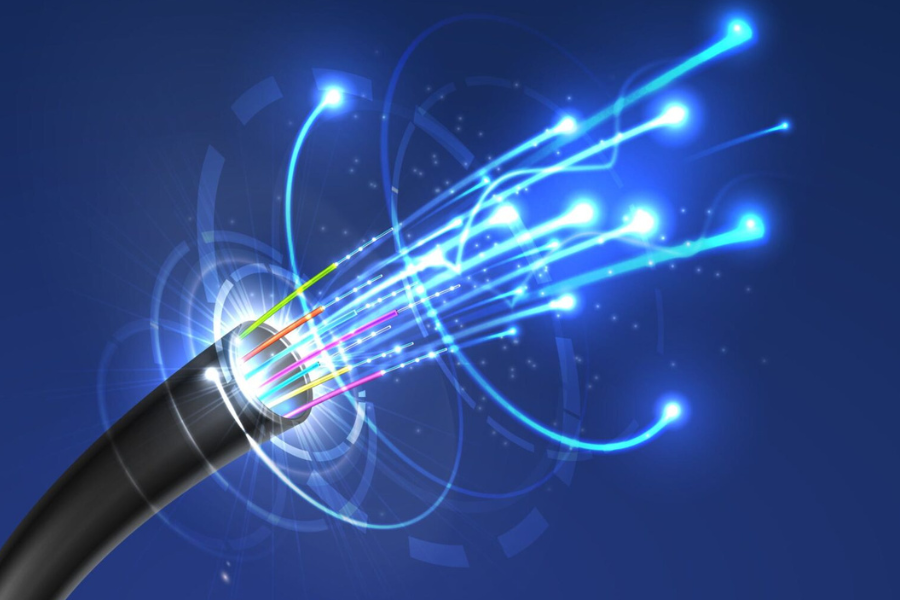What Are The Pros and Cons of Fiber Optic Internet?
The Pros of Fiber Optic Internet
Speed of Gigabit
Fast speed is one of the best things about fiber optic internet. The speed is 1 gigabit per second (Gbps). A standard internet link, on the other hand, is between 25 and 100 Mbps. In other words, fiber optic internet is 40 to 10 times faster and gets even better.
It’s great to have gigabit speed, like playing online games, getting and sharing big files, and watching movies and music. You won’t have to deal with buffering or lag either, which makes it great for streams, gamers, and people who work from home.
Security
Fibre optic internet sends data through light, which makes it very hard to hack or intercept. This enhanced security is one of the key advantages of using fiber optic internet, particularly for individuals who engage in sensitive online activities such as shopping, banking, or working remotely. Knowing that your data is secure adds peace of mind and reassurance to your online experience.
Durability
Generally, fiber optic internet lasts longer than copper internet in harsh weather and other situations. That’s because power doesn’t flow through fiber optic lines. Because of this, they are less likely to be damaged by water and direct effects. On the other hand, copper wires can slowly break down over time.
Not a Data Cap
Many fiber optic deals are unlimited, depending on how much data you use. That means you don’t have to worry about exceeding your data limit when using the internet. Also, homes with many people using the internet gain from not having data caps. You can no longer fight over what to do on the internet.
Fast Uploads
This is equal speed, meaning that when you post or receive something, it goes at the same speed. Having symmetrical speed is essential for people who often send big files or video chat. Cable internet, on the other hand, has different speeds for everybody. This is a big plus if your download speeds are fast, but your upload speeds are slow.
Low Latency
Latency is the time it takes for information to move from one place to another. When you do something online, fiber optic internet reacts quickly because it has a low delay. Low latency is excellent for online games or virtual reality, where a slight delay can make a big difference. Additionally, why fiber connection is better becomes evident due to its ability to provide consistently low latency, ensuring smooth and responsive online experiences, especially for high-demand applications like gaming and virtual reality.
Cons of fiber optic internet
Higher Price
Price is the first thing most users consider when comparing the pros and cons of fiber optic internet. Fibre optic internet can cost more than other plans, which is one of its main problems. Some people may be willing to pay more for better speeds and other perks. Because so many people wish to access fiber internet, it costs more. There is a greater need for faster and more efficient services as more people use the internet for activities that use a lot of data. When more people want fiber optic internet, prices increase because service companies want to recoup the costs of improving their equipment and providing high-quality service. When you look at how much fiber optic internet costs, you might have to pay a lot for the beginning equipment, like laying the fiber optic lines. This cost could be passed on to customers by service providers, which would mean higher prices.
Availability
Fibre internet is only available in some places, which is too bad because not everyone can use it. 43-45% of people in the United States now have access to fiber. Find out if the ISPs in your area offer fiber optic deals by calling them. If not, you should use a different kind of internet until fiber comes to your location.
Prone to Physical Damage
Data is sent through fiber optic cables, which are thin and fragile. This makes them more likely to get damaged during installation than other cables. They need to be fitted by professionals like Cronus because they aren’t as strong. Some service providers include installation as part of their service, but others don’t, so you may need to set aside some money for the process.
Conclusion
In general, when comparing the pros and cons of fiber optic internet, you will see there are more pros than cons to fiber optic internet. Do get it if it’s available at your location and if you can afford it. It has low lag, fast speeds, protection, and no data caps. Before you choose a plan, make sure you learn about them and weigh their pros and cons. Fiber internet from Cronus is the best choice if you need fast and stable internet for streaming, games, or other high-bandwidth activities. Please don’t be afraid to try it; you will be amazed at how much better it makes the internet.
Frequently Asked Questions
What is the downside of fiber internet?
One of the main cons of fiber optic internet is that it can be more expensive than other internet plans. However, the faster speeds and other benefits may be worth the extra cost for some people.
Which is better, WiFi or fiber optic internet?
If you find a difference in speed in both networks, you will find that fiber optic provides a much higher speed than wireless networks.
How fragile is fiber-optic cable?
The glass fiber within the cable is fragile, and although the cable has been designed to protect the fiber, it can be damaged more quickly than a copper wire. The most common damage is a broken fiber, which is difficult to detect. However, fibers can also crack due to too much tension during cable pulling or despoiling.


